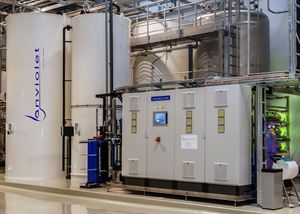uv reactors, photo-oxidation, advanced oxidation (aop), recycling & engineering
for industrial use
Elimination of Active Pharmaceutical Ingredients (API) in wastewater by AOP
Advanced oxidation processes eliminate APIs in wastewater
By selectively eliminating functional chemicals (active pharmaceutical ingredients (API), pharmaceutically active compounds (PhACs)) we supply an economical tool to eliminate active pharmaceutical ingredients in wastewater from pharmaceutical and chemical production. In these applications, we offer an array of advanced oxidation processes with different scopes:
- Degradation of the active ingredients like APIs or PhACs, below a defined target concentration. Active pharmaceutical substances are degraded by advanced UV oxidation to below the PNEC, or so far that the PNEC of the APIs can be complied with.
- Degradation of the active ingredients by advanced UV oxidation to below the PNEC and destruction of the by-products. The wastewater matrix is completely detoxified. We also use this type of advanced oxidation process to treat antibiotics to prevent the formation of multidrug-resistant bacteria.
- Advanced UV oxidation until complete detoxification and maximum bioavailability. Here, our advanced UV oxidation processes treat wastewaters in such a way that, in combination with a biological treatment, COD initial concentrations between 50 and 100 g/L are reduced to concentrations down to approx. 30 mg/L. In many cases, then the direct discharge to rivers is allowed.
Typical example applications for API-elimination that are using our advanced oxidation processes are:
- Antibiotics, e.g. Sulfamide, Penicillin, Amoxicillin ...
- Hormones, such as Cyproterone acetate, Letrozole, Ethinylestradiol, Levonorgestrel, ...
- Cytostatics, such as Capecitabin, Vinorelbin, ...
- Complex structures, such as Pantopranzole, Urapidil, ...
- Solubilizers, e.g. Triton, Octylphenols, ...
If desired, an advanced oxidation process (AOP) with our UV systems can completely mineralize the hazard organics including organic matrix.
For elimination of API and PhACs you find several cases studies here.
Elimination of cytostatic API in wastewater by photo-oxidation
Photo-reactive combustion in aqueous phaes is farly better compared to incineration of water!
Elimination of cytostatic substances (Pharmaceutically active compounds) demand highest requirements to elimination technology. All cytostatic API are highly potent and are not allowed to be exposed to humans.
Cytostatic substances have to be eliminated completely.
Huge advantage of Enviolet UV Oxidation of cytostatics are low OPEX at very interesting CAPEX. Units are operating completely automatic and even can be equipped for man-less operation without any residues.
Most pharmaceuticals send wastewater contaminated with cytistatic substances to incineration, as a thermal proces is best distruction. Thermal disposal like incineration for example shows costs which are higher for orders of magnitude and incineration of water can not be considered as an ecologically meaningful process, but Enviolet enables the user to also use a thermal distruction method, but operating in the aqueous phase, called light induced cold combustion.
Therefore, Enviolet's advanced UV-Oxidation offers best elimination of Pharmaceutically active compounds (PhACs) under economic and ecologic aspects. The photo-oxidation reduces the CO2-emission in relation to te applied standard method by more than 95%.
A new publication published together with Catalent regarding the advanced UV-oxidation to dispose off cytostatic wastewater environmentally friendly will be published in June 2019.
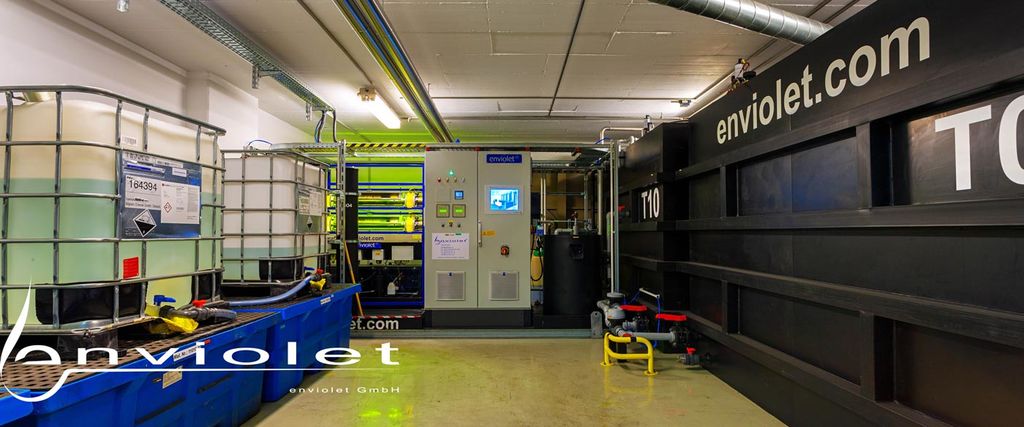
UV-Oxidation of hormones in CIP-rinse wastewater
Advanced UV-oxidation is most sustainable process for elimination of API without any contaminated side-stream or secondary waste
Enviolet UV-Oxidation is best for elimination of hormones. Many Enviolet installations are used in pharmaceutical industry for elimination of highly potent hormones and also other Pharmaceutically active Compounds.
Enviolet-process is robust and efficient. With this process the user has available an easy and economic disposal method.
As special feature, the Enviolet-process does not need any pre-treatment, and no contaminated liquid and no solid side-streams are generated.
Publication elimination of hormones at Aenova Haupt Pharma.
Enviolet offers best elimination of Active Pharmaceutically Ingredients (API) under economic and ecologic aspects:
- Economic advantage: Enviolet advanced UV-Oxidation offers best CAPEX and OPEX in relation to all serious alternatives
- Environmental advantage: Enviolet advanced UV-Oxidation proves to operate with lowest possible ecologic side effect and huge CO2-saving
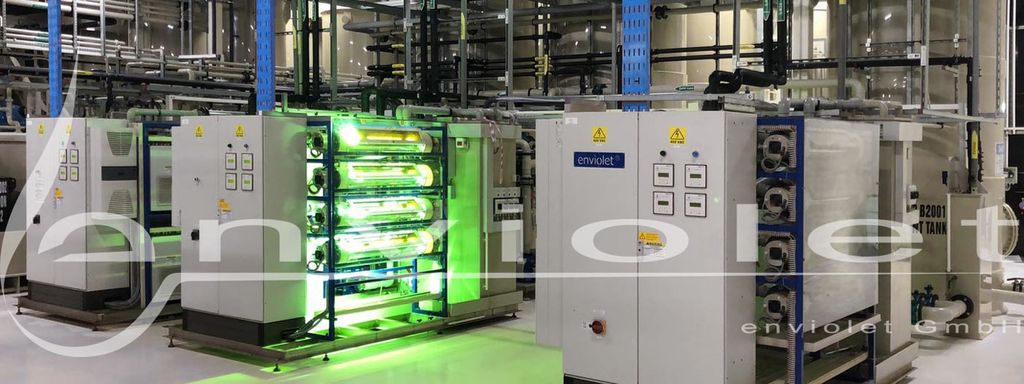
UV-Oxidation of antibiotics in wastewater
Elimination of multi-resistant-germs
Antibiotics are problematic compounds for wastewater treatment because in their presence biological wastewater treatment plants cannot be applied, or show a bad performance. Today even the risk of forming multi-resistant-germs is known, when low amounts of antibiotics are sent to biological wastewater treatment plants.
Enviolet UV oxidation is used to detoxify wastewater at many antibiotic producers. The UV oxidation is usually used as a pretreatment for the highly loaded mother liquor, which then later diluted due to the high salt load with other factory effluents, before sent to biological treatment.
The UV oxidation of antibiotics are beautiful examples of effluents with high COD (50 - 80 g/L) and high salt loads (up to 200 g/L) can be successfully detoxified with advanced UV oxidation, and simultaneously formation of multi-resistant germy will be prevented in wastewater..
In addition to the antibiotics, other compounds such as phenols and others are converted to harmless and often natural ingredients like acetic acid, malonic acid, or apple acid, by means of photo-oxidation.
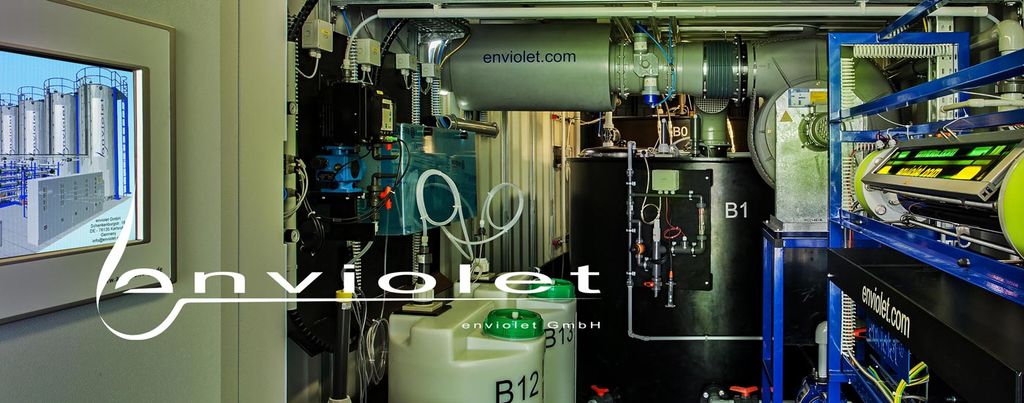
Treatment of wastewater from production of multi-API-sites
Wastewater from multiple API manufacturing and formulation is detoxified and biodegradable
There are special requirements for the production of API in combination with the formulation on the same site. On the one hand, high fluctuations in concentration must be safely treated, and on the other, a large number of different active pharmaceutical ingredients must be safely degraded below the target concentration, without remaining critical degradation-products. Since a subsequent biological treatment is often initiated, the toxic ingredients have to be converted into biodegradable ones and e.g. nitrification inhibitors have to be completely destroyed / eliminated.
In addition, the wastewater no longer contains any active ingredients after UV oxidation, or the active ingredients of the API are below the permissible discharge values.
Our UV-AOP systems already meet all of these requirements at a large number of pharmaceutical sites.
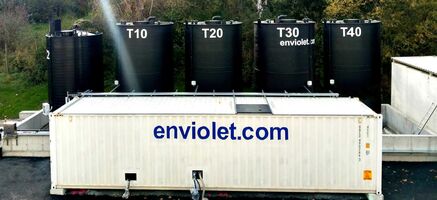
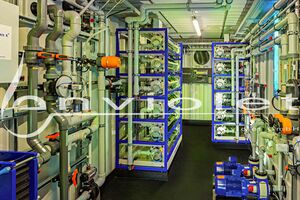
Treatment of wastewaters from synthesis of API and Intermediates
Synthese of API and intermediates leads in many cases to critical wastewaters
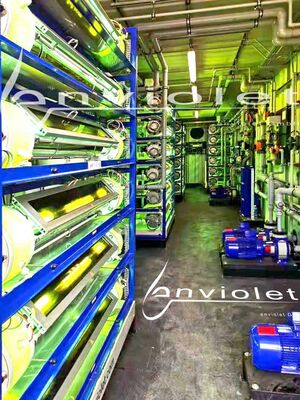
The synthesis of active ingredients (API) and intermediates creates waste water that can rarely be treated with traditional methods.
A common solution is incineration, which is expensive, not very environmentally friendly and shows a very negative CO2 balance.
enviolet offer uv-oxidation systems for concentrated and difficult to treat wastewater, which are environmentally friendly and cost-effective treatment:
Solution 1: Oxidation until direct discharge. Further info.
Lösung 2: Oxidation as pre-treatment for a site-biologigal wastewater treatment system, or an external biologische wastewater treatment system, e.g. of the municipality. Further info.
In the chemical and pharmaceutical industry in particular, we treat mostly wastewaters with very high organic loads in a large number of such plants and offer an extremely economical solution with fast pay-back. For a short while now, users have also benefit from the very good CO2 footprint of these environmentally friendly solutions.








